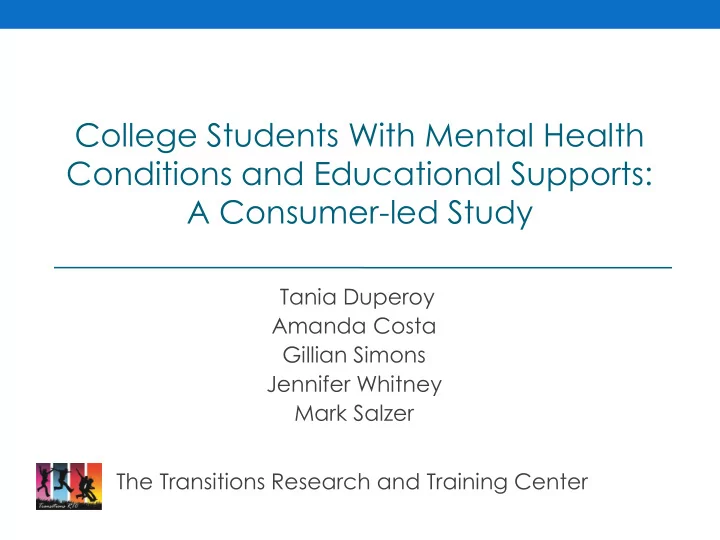

College Students With Mental Health Conditions and Educational Supports: A Consumer-led Study Tania Duperoy Amanda Costa Gillian Simons Jennifer Whitney Mark Salzer The Transitions Research and Training Center
Visit us at: The contents of this presentation were developed with funding from the US Department of Education, National Institute on Independent Living Disability and Rehabilitation Research, and the Center for Mental Health Services, Substance Abuse and Mental Health Services Administration (NIDRR grant H133B090018). Additional funding provided by UMass Medical School’s Commonwealth Medicine division. The content of this presentation does not necessarily reflect the views of the funding agencies and you should not assume endorsement by the Federal Government.
Who We Are The Transitions RTC aims to: Improve supports for the successful completion of • schooling and movement into rewarding work lives among young people, ages 14-30, with serious mental health conditions How? Conduct cutting-edge rigorous research that tests or • informs interventions Develop and translate knowledge to multiple • stakeholders
Participatory Action Research (PAR) “Participatory Action Research (PAR) is a process in which researchers and transition age youth (TAY) collaborate on a research project designed to improve mental health services. Collaboration requires that TAY have the opportunity to be actively involved in all phases of the research from defining the problem to disseminating results”(Delman, J. 2011).
Research Questions • What are the experiences and perspectives of young adult college students with mental health conditions on seeking and using reasonable accommodations in a college setting? • Do these experiences and perspectives differ from older adults?
National Survey of College Students With Mental Illnesses* • Original data collection by Mark Salzer, Ph.D., Temple University Collaborative on Community Inclusion • Anonymous internet survey • Data Collected July 2005-July 2006 • Inclusion Criteria: • Current or former college students who completed at least one semester of schooling • Age 18 or older • Self-reported diagnosis of mental illness/es *This study used data supported by grant H133-B03- 1109 for the University of Pennsylvania Collaborative on Community Integration of Individuals With Psychiatric Disabilities from the National Institute on Disability and Rehabilitation Research (Salzer, principal investigator)
Sample • 520 Completed Surveys • 10 didn’t consent • 11 excluded (age of attendance missing) • N = 499
Demographics Gender % N Female 79.0% 291 Male 20.2 100 Transsexual/Transgender 0.8 4 Race % N White 85.3% 419 Black 3.7 18 Asian 2.2 11 More than one race 5.7 26 Other 3.1 15
Demographics cont.. Mean Status of Attendance % N SD Age Current Students 37.5% 187 31.5 11.6 Previous Students 62.5 312 33.5 10.2 School Classification % N Undergraduate 59.9% 297 Graduate/Professional 38.7 192 Other 1.4 7
Demographics cont.. Self-Reported Diagnosis % N Bipolar Disorder 38.3% 191 Major Depression 29.3 146 Schizophrenia Spectrum 10.4 52 Anxiety Disorders 14.6 73 Other 7.4 37 Medication during % N college Yes 72.9% 363 No 27.1 135
Mental Health Questions Ever received outpatient % N mental health services Yes 87.7% 436 No 12.3 61 Psychiatric symptoms % N affected educational experience Not At All-Seldom 13.7% 67 Some of the time-Most of 86.3 423 the Time
New Variable: Age While Attending College Age while attending college % N M SD Young Adults (<31 Years) 52.1% 260 24.9 3.9 Older Adults (>=31 Years) 47.9 239 42.0 6.8 • For Current Students • Used age at completion of survey • For Previous Students • Birth Year and Leave Year calculated age when leaving college • For some participants (n=27), they entered college as young adults, and left as older adults • Calculated their mean age while in college
Have you utilized services of your institution’s office for students with disabilities? 100 90 Young Adults Older Adults 80 70 60 50 36.0% 40 28.5% 30 20 10 0 Utilized Disabilities' Office *p = n.s.
How familiar are you with accommodations that you might be entitled to under the law? 100 Young Adults 90 Older Adults 80 70 60 53.7% 50 39.1% 36.1% 40 33.6% 30 24.8% 20 12.0% 10 0 Very-Extremely Slightly-Moderately Not At All *p = .000
Have you ever requested or received specific academic accommodations at your college? 100 Young Adults 90 Older Adults 80 70 60 50 39.1% 40 30.1% 30 20 10 0 Requested Accommodations *p<.05
Requested/Received Accommodations Re-coded 100 Young Adults 90 81.6% 79.2% Older Adults 80 70 60 50 40 30 20 10 0 Requested Accommodations *p = n.s.
Types of Accommodations Received 100 Young Adults 90 Older Adults 80 75.1% 68.3% 70 56.5% 60 54.6% 54.4% 49.2% 50 40 30 20 10 0 Assignment Classroom Exam *p = n.s.
Top 5 Accommodations Requested or Received 1. Tutoring in course materials 2. Extended time to complete assignments 3. Use of a tape recorder 4. Private feedback on academic performance 5. Provision of Incomplete (I) grade rather than a Failure (F) if relapse occurred
Top 5 Difficulties When Requesting or Receiving Accommodations 1. Feeling embarrassed about disclosing to faculty 2. Fear of being stigmatized by faculty 3. Feeling inferior to other students 4. Fear of being stigmatized by other students 5. Uncooperative or unreceptive faculty
Next Steps… • Continue analysis based on young adult/older adult age groups • Look at the experiences and perspectives of young adults and adults in regards to stigma on campus • Limit data to current students and analyze relationships • Design an internet web survey to further investigate the experiences of young adults with mental health conditions on college campuses
Acknowledgements A “Thank You” to the following people for their support in this project: Chuck Lidz Kathryn Sabella Jon Delman Bernice Gershenson Lisa M. Smith Maryann Davis
Thank You! • Amanda Costa • amanda.costa@umassmed.edu • 508-856-2865 • Tania Duperoy • tania.duperoy@umassmed.edu • 508-856-2168 Get more information and publications from the Transitions RTC at http://labs.umassmed.edu/transitionsRTC/
Recommend
More recommend